【高级英语】unit2_psychology_student version
- 格式:docx
- 大小:204.74 KB
- 文档页数:10
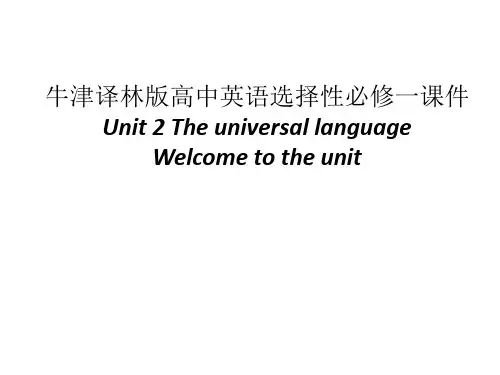

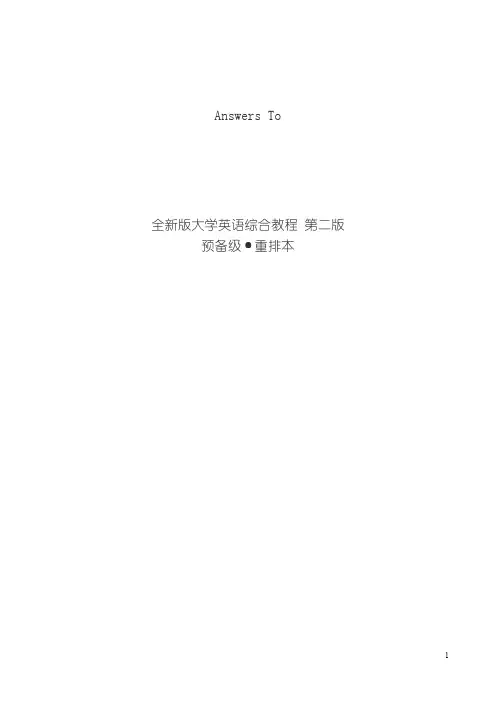
Answers To全新版大学英语综合教程第二版预备级·重排本UNIT ONEText A:Reading ComprehensionI. 5, 1, 7, 11, 2, 4, 6, 9, 8, 10, 3II. 1. a freshman2. to others that she was not3. make a timely entrance4. Freshman manuals5. American Literature6. she was in the right classroom7. had stepped on a piece of cheese8. no one had noticed9. decided to go back to the cafeteria to eat10. bad fate would only fall on her11. silly12. popularityIII. 1. F 2. F 3. T 4. F 5. T 6. T 7. F 8. T 9. T 10. F 11. TFrom Reading To Speaking (Left out)Vocabulary And Sentence PracticeI. 1. arise 2. advised 3. come to their feet /arise4. determines5.left6.show up7. made her way8. in no time 9. no matter how 10. went out toII. 1. a. pitiless b. pity c. pitifuld. pitifully2. a. safe b. safe c. safely d. safety3. a. sound b. sound c. sounds d. soundly4. a. popularity b. popularize c. popularly d. popularIII.1. A. 我只想能顺顺当当地找到自己的宿舍B. He wanted nothing more than to help her.2. A. 无论我自以为有多么成熟,我还是觉得有些像一年级新生似的。
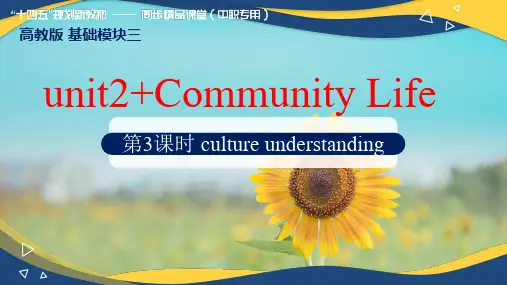
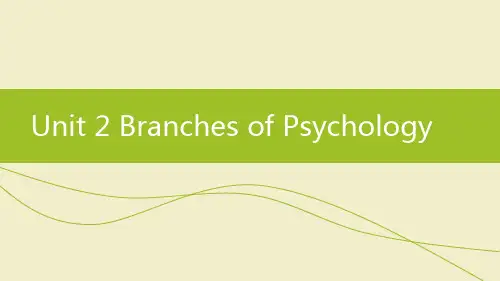
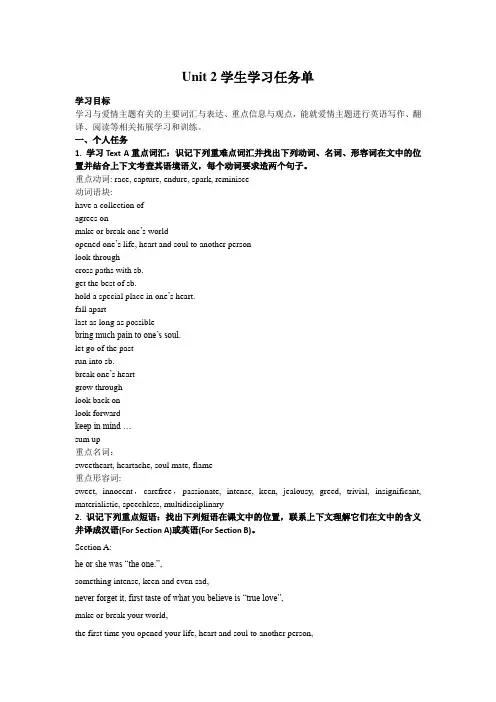
Unit 2学生学习任务单学习目标学习与爱情主题有关的主要词汇与表达、重点信息与观点,能就爱情主题进行英语写作、翻译、阅读等相关拓展学习和训练。
一、个人任务1. 学习Text A重点词汇:识记下列重难点词汇并找出下列动词、名词、形容词在文中的位置并结合上下文考查其语境语义,每个动词要求造两个句子。
重点动词: race, capture, endure, spark, reminisce动词语块:have a collection ofagrees onmake or break one’s worldopened one’s life, heart and soul to another personlook throughcross paths with sb.get the best of sb.hold a special place in one’s heart.fall apartlast as long as possiblebring much pain to one’s soul.let go of the pastrun into sb.break one’s heartgrow throughlook back onlook forwardkeep in mind …sum up重点名词:sweetheart, heartache, soul mate, flame重点形容词:sweet, innocent,carefree,passionate, intense, keen, jealousy, greed, trivial, insignificant, materialistic, speechless, multidisciplinary2. 识记下列重点短语:找出下列短语在课文中的位置,联系上下文理解它们在文中的含义并译成汉语(For Section A)或英语(For Section B)。
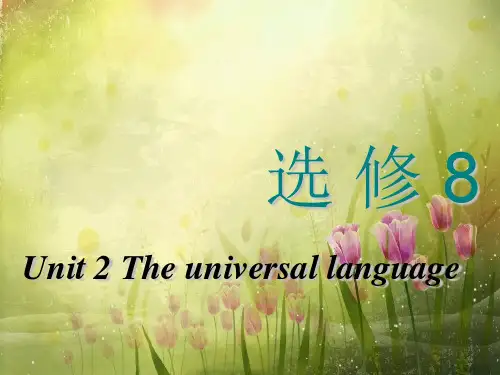
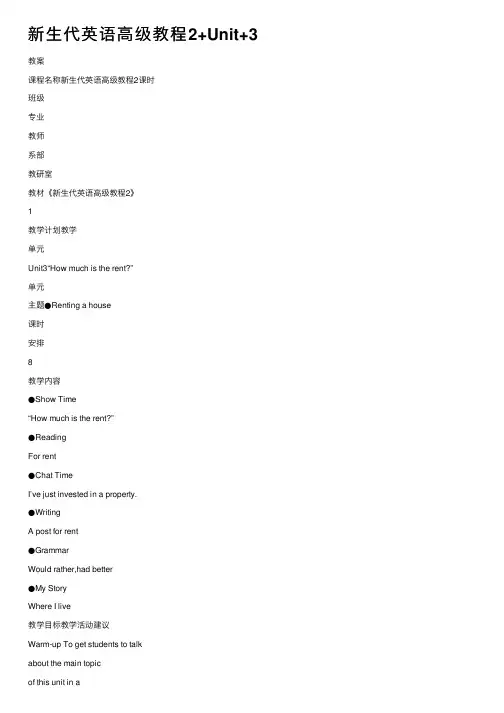
新⽣代英语⾼级教程2+Unit+3教案课程名称新⽣代英语⾼级教程2课时班级专业教师系部教研室教材《新⽣代英语⾼级教程2》1教学计划教学单元Unit3“How much is the rent?”单元主题●Renting a house课时安排8教学内容●Show Time“How much is the rent?”●ReadingFor rent●Chat TimeI’ve just invested in a property.●WritingA post for rent●GrammarWould rather,had better●My StoryWhere I live教学⽬标教学活动建议Warm-up To get students to talkabout the main topicof this unit in acomfortable andrelaxed manner●Explain to students that the focus of thisunit is on renting property and services.●Ask students to tell you what they knowabout renting a property,such as:Whatwould you need to do first,if you want torent a house?●Organize students into pairs.Give themseveral minutes to complete the task.●Check answers around the class.Focus onthe correct pronunciation of the newwords and expressions.2Vocabulary Builder A and BTo teach students newvocabulary related torenting a house ●Have students listen and repeat the words and the expression,teaching the definitionfor each one.You can check theircomprehension by asking questions,suchas:What is the agreement you sign whenyou rent a house?(lease)What do we calla person who owns a rental property?(landlord)What substance is burned forheating?(gas)●Once students seem comfortable with thenew words and the expression,have themcomplete Exercise B and then switchbooks.Go through the answers,calling ondifferent students each time.Correct anyerrors.●If you want to,you can start each classwith a short spelling test,which worksquite well as a warm-up.CTo improve students’listening and comprehension skills ●Tell students they will hear a conversation in which a woman tells her friend abouther new place.●You may need to go over a few words inthe conversation,such as utilities,downtown and App.You can write thesewords on the blackboard and askquestions,such as:Which word means thecommercial part of the city?(downtown)Which word means useful householdthings such as water,gas and electricity?(utilities)Which word is a softwareprogram?(App)●Play the audio,twice if necessary.Pausethe audio so that students have time to fillin the blanks.DTo improve students’speaking and comprehension skills●Ask students to look at the picture andelicit what it is(a layout plan of anapartment).●Challenge students to see who can be thefirst to correctly label the plan.●Check answers around the class,focusingon the correct pronunciation of the targetlanguage.3Show Time ATo teach studentsspeaking skillsthrough the use ofpictures ●Tell students to look at the pictures andask some basic comprehension questions,such as:Who are these people?Where arethey?What are they doing?●Ask students to guess what happened inthis video and to match the pictures to thesentences according to their ownunderstanding.●Have students watch the video in itsentirety.Ask them to check their answerswith a partner.B,C and DTo improve students’listening comprehension through the use of video ●For Exercise B,ask students to read through each statement and to decide if itis true or false.●For Exercise C,play the video again.Havefour students read out the conversation.You can also have students rewrite theconversation,using the words andexpressions learned in this unit.●For Exercise D,have students readthrough each sentence and choose thecorrect word.●Check the answers for Exercises B,C,andD.Students can exchange books andlisten as you go through the answers.Reading A,B and CTo improve students’readingcomprehensionExercise A●Get students to glance at the ads and tellyou what are for rent,referring to thepictures and titles.●Read the rubric and give students severalminutes to complete the task.Stress thatthey do not need to understand everysingle word in order to match thesentences to the ads.●Check answers around the class. Exercise B●Ask students to read the ads morethoroughly.Encourage students to refer toWORDS&EXPRESSIONS.●Read the rubric,stressing that studentsmust complete the sentences with amaximum of three words.●Allow students to check their answers with4a partner before conducting classfeedback.Exercise C●Get students to choose the best answer toeach question.●Check answers around the class.D,E and FTo review the useful words and expressions Exercise D ●Read the words in the boxes aloud,modeling correct pronunciation andgetting students to repeat after you.●Monitor as students complete thesentences,offering support wherenecessary.●Fast finishers can write their examplesentences using the words.●Check answers around the class. Exercise E●Read the rubric.Elicit the opposite of“danger”(safety)and do the first sentencetogether as an example.●Ask students to complete the rest of thetask alone.Be on hand to offer supportwhere needed.●Check answers around the class.Helpstudents remember the new language byasking questions,such as:Do youexercise regularly?What traditional fooddo you eat during the Spring Festival? Exercise F●Direct students’attention to the wordsearch.●Organize students into groups.Challengethem to see who can be the first tocomplete it.●As a possible extension task,get studentsto write sentences containing the wordsfrom this activity.Beyond the TextTo improve students’critically thinking abilityExercise A●Focus students’attention on the poster andnominate a student to read it aloud.●Check students’understanding by askingquestions,such as:Why might someonerent a laptop?(They can’t afford to buy5one.)When is the best time to rent alaptop?(Before the summer holiday,asthere is a discount.)●Read the rubric /doc/c3c52ead0b12a21614791711cc7931b764ce7b65.html anize students into pairs.Give them several minutes todecide on the product they want toadvertise,and then ask them to take notes.●Circulate as students design their posters.Encourage them to refer to the exampleposter.●Check the wording of students’posters.Ifthere is time,students should decoratetheir posters to make them as attractive aspossible.Display students’work on theclassroom wall.Exercise B●Read the rubric aloud.Elicit the meaning of the term“sharing economy”.(An economic system in which property and assets are shared or exchanged between individuals.)●Organize students into small groups.Ask them to discuss and to make a list of the pros and cons of sharing economy.●Monitor student’s discussions,prompting them where necessary and taking notes of any particularly interesting ideas.●Conduct class feedback.Generate as much discussion as possible and write any new language on the blackboard.Chat Time To improve students’listening,speaking,writing and actingskills through the useof conversationExercises A&B●For Exercise A,explain to students that they will hear a conversation in whichtwo people discuss property investment. Introduce the key words for this conversation.●Tell students to listen carefully and to write down what they hear in the blanks.If necessary,pause the audio so that students have time to write.●Have students practice talking about housing using the questions in Exercise B.●Have students read through LANGUAGE 6Writing To improve students’writing skills andlearn to write a postExercise A●Tell students that they are going to learn how to write a post looking for a roommate.●Focus students’attention on Greg’s post. Read the post as a class.Ask questions to check students’understanding,such as: How many bedrooms does Greg’s apartment have?How much is the rent? What kind of roommate is he looking for?●Ask students to read Marco’s reply and get them to complete the three boxes.●Allow students to check their answers witha partner before conducting class feedback.Exercise B●Focus students’attention on the words and expressions in the boxes.Allow them to check the meanings of any unfamiliar ones.●Read the rubric aloud and ask students to complete the task.●Check answers around the class. NOTE,which teaches idioms related to eggs.Ask students if they know any other idioms related to food.Exercise C●Read the rubric.Focus students’attention on the pros and cons of buying and renting a property.Discuss these as a class,and allow students to ask questions about any unfamiliar language.●Ask two confident students to readEXAMPLE aloud.Get students toperform the role-play in pairs.Circulate, noting down examples of good language you hear,and also writing down any issues to address in the class feedback session.●Conduct class feedback.Nominate a pair to perform their role-play to the rest of the class.7Exercise C●Tell students to match the two halves to make sentences which would typically be found in posts seeking roommates.●Challenge students to see who can be the first to complete the task.●Read the sentences around the class.Ask students to rewrite the sentences so that they could be true for them and their apartments.Exercise D●Read the rubric aloud.Encourage students to refer to the previous exercises to help them write their posts.●Circulate as students write their posts, offering support where necessary.●Display students’posts on the wall.Get students to choose the one they find most attractive and to explain why they chose it.Grammar To teach students howto use would ratherand had betterExercise A●Start by explaining that we use wouldrather to express a preference.Write an example on the blackboard,such as:I would rather eat a hamburger than a hot dog.Tell students that we say the thingwe want to do first.Ask students to comeup with their example sentences.●Explain that we use had better to give strong advice to someone.Write an example on the blackboard,such as:You had better study for the test.Ask studentsto come up with their example sentences.●Once students seem comfortable with the grammar,have them complete the exercise and then switch books to correct their mistakes.Exercise B●Get students to remind you of the difference between would rather and had better.●Ask students to skim the conversation and look at the pictures.Ask questions to8check understanding,such as:Why does Freya not like her roommate?What do Freya and Tracy decide to do?What would you do in this situation?●Read the rubric and get students to complete the task.Allow students tocheck their answers with a partner. Nominate a couple of confident studentsto perform the conversation to the rest of the class.My Story To improve students’listeningcomprehension andspeaking abilitythrough the use ofvideo Exercises A&B●Tell students that they will see a video in which real people talk about where they live.●Play the video and have students complete the true or false statements in Exercise A.In some cases,you may need to pause the video to help students.●Have students tell you the answers, correcting any mistakes.Play the video again and have students answer the questions in Exercise B,pausing the videoif necessary.Check students’answers, correcting any mistakes.Exercise C●Read the questions aloud.Give students several minutes to think about how they’ll answer each question and to take some notes.●Organize students into pairs to ask each other questions and to share their answers. Nominate a few students to report back on their partners’answers.课后学习设计作业◆Finish all the exercises in Unit3.◆Read the text in this unit again and try to summarise its content.◆Write a post for rent.课后总结与反思9补充教学资源Vocabulary Builder参考译⽂男:新房⼦怎么样?⼥:我感觉还不错。
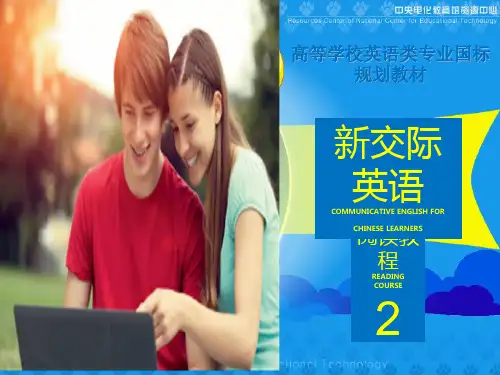


conversation.Lesson 1 Lesson 21 .And it is an activity only of 1. The burying--ground is merelyhumans. a huge waste of hummocky earth,And it is a humanunique activity .like a derelict building-lot.2 .Conversation is not for making The burying-ground is just a hugeapoin t. piece of wasteland full of moundsConversation is not to convince of earth, looking like a desertedothers .construction land.3 .In fact, the best 2. All colonial empires are inconversationalists are those who reality founded upon that fact.are prepared to be lose.All colonial empires are built byIn fact, the best conversationalists exploiting the local people.are those who are willing to be 3. They rise out of the earth, theylose. sweat and starve for a few years,4.Bar friends are not deeply and then they sink back into theinvolved in each other ’ slives.nameless mounds oftheBar friends are notdeeply graveyard.concerned witheach other ’s They are born. Then they work hardprivate lives. without enough food for a few5....it could still go ignorantly years. Finally they die and areon... buried in the hills graves withoutThe conversation could go on any mark to identify them.without anybody 4. A carpenter sits knowing who was cr right orwrong .atu 6. There are cattle inthe field,chsp but we sitdown to beef.Acr These animals are calledcattle inanm English, when they arealive androfa feeding in thefields;but whenwe5.da sit down at the table toeat, we callalfre their meat beef inFrench .ru 7. The new ruling classhad built aImru cultural barrieragainst him bythro building their Frenchagainst hisinm ownlanguage .6.loo The new ruling classhad causedcigles the culturalcontradictionsimlu between the ruling classand nativeEvco English byregarding Frenchthso superior toEnglish.ofca 8.English had comeroyally intopoaf itsown.7.al English had gainedrecognition byfacotheKing .Hosk9 . The phrase hasalways beenEuno used a little pejoratively waand evenfacetiously by the lower classes. 8. In a tropical landscape one’sThe phrase, the king ’s Englishhaseye takes in everythingexceptalways been used disrespectfully the human being.and made fun by the lower classes. Against the background of a10. The rebellion against a tropical landscape, people couldcultural dominance is still there. notice everything but they cannotThere is still opposition to cultural see local people.monopoly . 9. No one would think of running11. There is always agreatcheap trips to theDistresseddanger that “words willharden Areasinto thingsfor us ”No one would propose the cheapWe tend to make the mistake that trips to the slums .we regard the things as they 10 ....for nine-tenths of therepresent . people the reality of life is an12. Even with the most educated endless, back-breaking struggleand the mostliterate, the King’ s to wring a little food out of anEnglish slips andslides in eroded soil.conversat ion. The real life of nine-tenths of theEven the most educated and people is that there is no end toliterated people will not always use their extremely hard work in orderthe formal English in their to get a little food froman erodedsoil .11.She accepted herstatus as an oldwoman, that is to sayas abeast of burden.She took it for grantedthat as an old womanshe should work likean animal .12.People withbrown skins arenext door toinvisible.People who havebrown skins arealmost invisible .13.Their splendidbodies were hiddenin reach-me-downkhakiuniforms...The soldiers woresecond—handkhaki uniforms whichcovered theirbeautiful well —built bodies .14.How long beforethey turn their gunsin the otherdirection? How longwill it take for themto attack us?15.Every whiteman there had thisthought stowedsomewhereor other in his mind.It is certain thatevery white manrealized this.Lesson31.And yet the same revolutionary belief for which our forebears fought is still at issue around the globe... And yet the same revolutionary belief which is the aim of our ancestors is still in dispute around the world.2.This much we pledge--and more.This much we promise to do and we promise to do more.3.United, there is little we cannot do in a host of cooperative ventures.If we are united, there is almostnothing we can not do through a lot of cooperation. 4. But this peaceful revolution ofhope cannot become the prey ofhostile powers.But this peaceful revolution whichcan bring hope in a peaceful way can not fall victims to enemycountry.5. .... Our last best hope in an agewhere the instruments of war have far outpacedtheinstruments of pace...The United Nations is our last andbest hope in the era where means of launching war have farsurpassed means of keeping peace.6. ...to enlarge the area in whichits writ may run...to increase the area where the UN ’s written documents may be effective.7....before the dark powers ofdestruction unleashed by science engulf all humanity in planned oraccidental self-destruction...before the evil atom weapon made possibleby science destroy all human beings in a planned way or by accident.8...yet both racingto alter thatuncertain balanceof terror thatstays the hand of mankind ’s final war... However both trying to change that unstable balance of weapons and this balance of weapons could prevent human beings fromlaunching their finalwar.9.S o let us beginanew, rememberingon both sides thatcivility is not a sign of weakness.. . So let us begin onceagain to realize that politeness does notmean weakness.10.Let both sides seek to invoke the wonders of science instead of its terrors.I suggest both sidestry to use science tomake wonders forhuman beings rather than terrors.11. ...eachgeneration ofAmericans has beensummoned to givetestimony to itsnational loyalty.There areAmericans fromevery generationwho answer the callof the country toprove their loyaltyto the country.12.With a goodconscience our onlysure reward, withhistory the finaljudge of our deeds,let us go forth tolead the land welove...Our certain rewardis our goodconscience andhistory will judgeour deeds,therefore, let us tryto be pioneers inbuilding ourbeloved country.Unit51.The slightedmention of thedecade bringsnostalgicrecollections tothe middle-aged...At the very mentionof this postwarperiod ,middle-agedpeople begin tothink about itlongingly.2.The rejectionof Victoriangentility was ,in anycase ,inevitable .In any case,anAmerican could notavoid casting asidemiddle-classrespectability andaffected refinement.3.The war actedmerely as acatalytic agent inthis breakdown ofthe Victoriansocial structure...The war onlyhelped to speedup the breakdownof the Victoriansocial structure.4...it wastempted ,inAmerica at least,to escape itsresponsibilitiesand retreatbehind an air of naughtyalcoholicsophistication...In America atleast,the young people were strongly inclinedto shirk their responsibilities. They pretended to beworldly-wise, drinkingand behavingnaughtily.5.Prohibition affordedthe young theadditionalopportunity of makingtheir pleasures illicit...The young found greater pleasure in drinking because Prohibition, by making drinkingunlawful,added a senseof adventure.6...our young men began to enlist under foreign flags.Our young men joinedthe armies of foreign countries to fight inthe war.7....they“wanted to get into thefun before the whole thing turned belly up. ”The young wanted to take part in the glorious adventure before the whole ended. 8...they had outgrown towns and families.. . These young peoplecould no longer adaptthemselves to lives intheir hometowns ortheir families.9..the returningveteran also had toface thesodden,Napoleoniccynicism ofVersailles,thehypocritical do-goodism ofProhibition...The returningveteran also had toface the stupidcynicism of thevictorious allies inVersailles who actedas cynically asNapoleon did,and toface Prohibitionwhich the lawmakershypocriticallyassumed would dogood to the people.10.Something in thetension-riddenyouth of Americahad to “give ”...(Under all this forceandpressure)something inthe youth ofAmerica,who werealready verytense ,had to breakdown.11....it was onlynatural that hopefulyoung writers , theirminds and pensinflamed againstwar, Babbittry, and“Puritanical ”gentility, shouldflock to thetraditionalartistic center...It was only naturalthat hopeful youngwriters ,whoseminds and writingswere full of violentanger against war,Babbittry,and“ Puritanical ”gentility,shouldcome in largennumbers to live inGreenwich Village,the traditionalartistic center.12.Each town had its“ fast ” set whichprided itself on itself onits unconventionality...Each town wasproud that it had agroup ofwild ,recklesspeople,wholived unconventional lives.Unit71.With a clamor of bells that set the swallows soaring, the Festiva l of Summer came to the city Om elas.The loud ringing of the bells, whic h sent the frightened swallows flyi ng high, marked the beginning of t he Festival of Summer in Omelas.2...Their high calls rising like the swallows ’crossing flights over the music and singsing. The shouting of the children could be heard clearly above the music a nd singing like the calls of the swal lows flying by overhead.3. ..Exercised their restive horses before the race.The riders were putting the horses through some exercises because t he horses were eager tostart and stubbornly resisting the contr ol of the riders.4.Given a description such as thi s one tends to make certain assu mptions. After reading the abovedescriptio n the readeris likely to assume certain things.5.This is thetreason of artist: a refusal to admit thebanality of evil and the terribleboredom of pai n.An artist betrays histrust when he does notadmit that evil isnothing fresh nor noveland pain is very du lland uninteresting.6.They were nature,intelligent, passionateadults whose lives were not wretched.They were fully developedand intelligent grown-up peoplefull of inte nse feelingsand they were not miserable people.7. Perhaps it would bebest if you imagined itas your own fancy bids, assuming it willrise to the oc casion.Perhaps it would bebest if the rea derpictures Omelas tohimself as hisimagination tells him,assuming hisimagination will beequal to th e task.8.The faintinsistent sweetness of drooz may perfumethe way ofthe city.The faint butcompelling sweet scent of the drug droozmay fill the st reets ofthe city.9.Perhaps it wasborn defective, orperhaps it hasbecome imbecile through fear,malnutrition andneglect.Perhaps the child wasmentally ret ardedbecause it was born soor pe rhaps it hasbecome very foolish and stupid because of fear, poor no urishment and neglect.10. Its habits are too uncouth for it to respond to humane treatm ent.The habits of the child are so crud e and uncultured that it will show no sign of improvement even if it i s treated kindly and tenderly.11.Their tears at the bitter injust ice dry when they begin to perce ive the terrible justice of reality, and to accept it.They shed tears when they see ho w terribly unjust they have been to the child, but these tearsdry up w hen they realize how just and fair t hough terrible reality was.Unit81.....below the noisy arguments ,the abuse and the quarrels , there is a reservoir of instinctivefellow-feeling... The English peoplemay hotlyargue and abuseand quarrel witheach other , butthere still exists alot of naturalsympatheticfeelings for eachother in theirhearts.2....at heart they wouldlike totake a whip tothe whole idletroublesomemob of them.What the wealthyemployers wouldreally like to do is towhip all the workerswhom they regardas lazy andtroublesome.3...there are notmany of thesemen , either onthe board or theshop floor...There are not manysnarling shopstewards in theworkshop,nor arethere many cruelwealthy employerson the board ofdirectors.4.It demandsbigness ,and theyare suspicious ofbigness.The contemporaryworld demands thateverything shouldbe done on a bigscale and theEnglish do nottrust bigness.5.Against this , atleastsuperficially ,Englishness seems a poorshadowy show...At least on thesurface ,whenEnglishness is putagainst the powerand success ofAdmass ,Englishnessseems to put up arather poorperformance.6....while Englishness isnothostile tochange,it is deeplysuspicious ofchange for changes sake...Englishness is notagainst change,but it believes thatchanging justfor change ’ s sakeand not otheruseful purposes is verywrong andharmful.7.To put cars and motorways before houses seems toEnglishness a communalimbecility.To regard cars andmotorways as moreimportant thanhouses seems toEnglishness a publicstupidity.8.I must add that whileEnglishness can still fighton ,Admass couldbe winning. I mustfurther say thatwhile Englishnesscan go on fighting,there is a greatpossibility forAdmass to win.9.It must have somemoral capital to drawupon,and soon it maybe asking for anoverdraft. Englishnessdraws its strengthfrom a reservoir ofstrong moral andethical principles ,andsoon it may be askingfor strength which thisreservoir of principlescannot provide.10 .They probablybelieve ,as I do ,that the Admass ”GoodLife ” is a fraud on allcounts.There people probablybelieve ,as I do,that the“ Good Life ”promisedby Admass is false anddishonest in all respects.11...he will noteven find muchsatisfaction in thisscrounging messyexistence, whichdoesnothing for a man ’sself-respect.He will not even findmuchsatisfaction in thisuntidy and disorderedlife where he managesto live as a parasite bysponging on people.This kind of life doesnot help a person tobuild up any self-respect.12.To them the House ofCommons is a remotesquabbling-shop.These peopleconsider the Houseof Commons as aplace rather far awayfrom them wheresome people arealways quarrelingand arguing oversome small matters.13...heavy hands canfall on the shouldersthat have beenshrugging awaypolitics.They were very wrong toignore politics for theycan now suddenly andfor no reason bearrested and throwninto prison.Unit101. It is a complex fateto be an A merican.The fate of an American iscomplic’ated and hard tounderstand. 2...theywere no more at homein Europe than I was.They were uneasy anduncomforta ble inEurope as I was.3...we were bothsearching for o urseparate identities.They were all trying to findtheir o wn special individualities.4.I do not thinkthat could havemade thisreconciliation here.I don't think I couldhave accepted inAmerica my Negrostatus witho ut feelingashamed.5...it is easier to cutacross social andoccupational linesthere than it is here.It is easier in Europefor people of differentsocial groups andoccupa tions tointermingle and havesoci al intercourse.6. A man can be asproud of bein g agood waiter as ofbeing a go od actor,and in neither casefeelthreatened. In Europe agood wait er and a goodactor are equally pr oudof their social statusand posit ion. They arenot jealous of each other and do not live infear of losing their position.7. I was born in NewYork, but ha ve livedonly in pockets of it.I was born in NewYork but have liv edonly in some smallareas of the city.8.Thisreassessment, whichcan be very painful,is also very valua ble.The reconsideration ofthe signific ance andimportance of manythin gs that one hadtaken for granted in the past can bevery painful, tho ughvery valuable.9.On thisacceptance, literally,th e life of a writerdepends.The life of a writerreally depends o n hisaccepting the fact thatno ma tter where hegoes or what he doe she will always carrythe marks of hisorigins.10.American writers donot havea fixed society todescribe. Americanwriters live in amobile society where nothing isfixed, so they do not have a fixedsociety to describe.11..Every society is really governed by hidden laws, by unspoken b utprofound assumptionson thepart of the people.Everysociety is influenced and directed byhidden laws, and by many things deeply felt and taken for granted by the people, th ough not openly spoken about.。
18春《高级英语(II)》作业_1一、单选题(每题4分,共15道小题,总分值60分)l. ______________________ The driver of the car was for the damage caused to the passenger.A.liableB.reliableC.responsiveD.corresponding答案:A2.____________________________ New approached will have to be if youth are to be prepared for the change.A.developedB.developingC.take placeD・ go out答案:A3.______ There be any difficulty about passing the road test since you have practised a lot in the driving school.A.mustn'tB.shan'tC.shouldn'tD.needn f t答案:c4.lf he ___ me tomorrow, I would let him know・A.should callB.should not have been ableC.were not ableD.are not able答案:A5._________________ AII that can be done ・A.has been doneB.has doneC.have doneD.were done答案:A6.__ you did it is not known to all.A.WhoB.WhatC.HowD.Which7.motivatedA.excitedB.keen8.bitter or wounding ironic remarksA.sarcasmB.sarcous9.apartA.aswayB.asunder10」f he __ in England, what Ianguage could he probably speak now?A.were bornB.had been bornC.would have been bornD.was born11.happening or done immediatelyA.instantaneouslyB.immediately12.being successful or rich; good fortuneA.properB.prosperity13.The reas on __ I am writi ng is to tell you about my exami nation results ・A.whyB.whichC.whatD.how14.trouble and annoy sb continuallyA.harshB.harass15._ about the universe up till now.A.We know quite a lotB・ Only little we have knownC.Very little have we knownD.So much we do know二、判断题(每题4分,共10道小题,总分值40分)1.Accord!ng to education historian Diane Ravitch those who oppose tests in fact cheat on exams.2.To educators, “customizing education n refers to the various needs of individuals・3・Under such circumstances, what he needs is nothing but his family support!ng him・4.Among various thing in life, friendships and freedom are what he cares most about・5.A 1996 survey of teachers concluded that high school students become hopeless, spiritless and helpless.6.There may well be problems with insura nee and testing ・7.The surveys have indicated that thanks to a lot of kids ,the American Dream is in good hands.8.Theoden does not meet his death in battle directly at the hands of the Lord of the Nazgul because the Lord of the Nazgul does not have hands.9.Couples may be faced with difficult choices.10.Teens described in the text “The American Dream: What Teens Really Want" view racial strife as an essential belief which may express their sense of equality.18春《高级英语(II)》作业_2一、单选题(每题4分,共15道小题,总分值60分)l.biasA.prejudiceB・ conceit2」ohn used to be such a computer buff that he spe nt a large part of his in come to _ his computer when ever a new CPU was introduced ・A.imbibeB.modifyC.increaseD.upgrade3.perilA.dangerB.small pearl4.She scarcely cares for anything, ___ ?A.doesrft sheB・ does sheC.is sheD.isn't she5.strifeA.conflictB.struggle6.1 ack of interests on cer n or reactio nA.indiffereneeB.difference7.lt was hard work, but divided into groups, we ___ it easily・A.might completedB.might have completedpletedD.hadn't takene byA.PassB.obtain9・fundamentally and thoroughlyA.radicallyB.ridiculously10.lt is said that ___ was all what he said.A.thatB.whatC.howD.which11.We can only know she was in a room ___ p utty-colored walls.A.withB.ofC.in12.a nalyzeA.passB.parse13.He paid for a seat, when he __ have entered free・A.couldB.wouldC.mustD.need14.The hotel gave the whole family the ____ for the night.A.insurrectionB.indignationC.accommodationD.affection15.unpleasant,unattractive or not cheerfulA.gistB.grim二、判断题(每题4分,共10道小题,总分值40分)1.Accordi ng to the preside nt of Achieve, the problems standardized tests have caused lie in a lack of public understanding.2.The tone of this text “Is Scie nee Dan gerous? ” can be described as concer ned and cautious ・3.The remedy is not to take it from them, and to in form their directi on4.From the point of view of the author in passage H ls Scienee Dangerous?11, reliable scientific knowledge is dangerous.5.The American Army sets a good example for the racial healing.cation will no longer be meaningful as people have more and more information at their fin gertips.7・Windfola dies as the result of a heart attack・8.Schools, like the church, are regarded as conservative because changes in our world are so rapid and so decisive9.Racial harmony in the U.S. is essential because the rest of the world will likely follow such a model.10.Eowyn laughed at the Lord of the Nazgul because Eowyn is a women,the Nazgul Lord z s magic cannot protect him.18春《高级英语(II)》作业_3一、单选题(每题4分,共15道小题,总分值60分)l. _________________________________________________________ D angers and ethical issues come into play when scientific research ___________________________A.has been doingB.is doneC.doesD.did.2.excite pleasantlyA.tidilyB.titillate3.susceptibleA.easily in flue needB.doubtful4」f you know __ it was that write A Tale of Two Cities, raise your hand.A.whomB.whichC.whoD.that5.The warmth of _ sweater will of course be determined by the sort of wool used.A.theB.aC.anD./6.buckA.resistB.money7.person who answer a request for informationA.responseB.respondent8.Blood is thicker than __ water.A.theB.aC.anD・/9.purposefully or seriouslyA.intentlyB.intensify 10.indirect suggestion or expressionA.implicationB.impression11.whole-heartedlyA.raptorB.raptly12.familyA.kingB.kin13._ moved us most was that he liked after the old man for more than twenty years・A.WhatB.WhoC.WhomD.That14.Had Paul received six more votes in the last election, he ___ our chairman now.A.must have beenB.would have beenC.wereD.would be15.make sb feel worried, disappointed’and ups etA.dismayB.display二、判断题(每题4分,共10道小题,总分值40分)l.Scienee and technology are distinet from one another in that scienee came much earlier than tech no logy.2.This spring about 300 students in Massachusetts, boycotting the standardized test, demanded that tests be abolished.3.The Dark Lord is a synonym for the Lord of the Nazgul.4」n New York one of the education policy makers agree that students could be provided more channels through which to graduate・5.Schooling and education are two different things.6.Windfola and Snowmane are horses・7」n the text, the author argues that it is not for scientists to make moral or ethical decisions about the use of new technology because scientists have no special rights or skills in making such decisions ・8.Some Asian-America ns have made high academic achieveme nts.puters will play a prominent role in many aspects of school education.10.Windfola rides to battle on Dernhelm.18春《高级英语(II)》作业_4一、单选题(每题4分,共15道小题,总分值60分)1.prevale ntA.wide spreadB.value2.There is no easy answer _ the most basic question.A.onB.fromC.offD.to3.After the gun shot at Columbine in Colorado, the _ suggested that many schools in the United States were full of drugs and weapons.A. pressB・ mediumC.channelD.media4._ , she was very brave・A.Girl as she wasB.As she was a girlC.A girl as she wasD・ Girl as was she5.The _ differenee between men and apes is intelligenee.A.elementaryB.essentialC.baseD.necessary6」o hn, there is _ Mr. Wils on on the phone for you.A.theB.aC.anD./7.dull or ordinaryA.banB.banal8.very annoyingA.blastedB.basket9.Very few will doubt that it is scie nee that has at once quicke ned the dema nd for general education in modern times _____ made the education itself effective・A.as well asB.but alsoC.and asloD.and10._ about wild plants that they decided to make a trip to Mexico for further research.A.So curious the couple wasB.So curious were the coupleC.How curious the couple wereD.The couple was such curiousthis densely populated city, acid rain is _; it is a sign both of industrialization and pollution.A.prevale ntB.pregnantC.popularD.possible12.tangled or twistedA.bargainB.barnacled13・By the time Juan gets home, his aunt ____ •A.will leaveB.I eavesC.will have leftD.is leaving14.possibleA.pregnantB.likely15._____________________________________________________________ No matter what high positions one may hold, he or she should guard against _________________ ・A.arroganeeB.artifactC.archivesD.ascertains二、判断题(每题4分,共10道小题,总分值40分)l」n the text “Is Scienee Dangerous?'1, the author argues that it is not for scientists to make moral or ethical decisi ons about the use of new tech no logy because scie ntists have no special rights or skills in making such decisions.2.The film depicted the cruelty a gladiator had to face in the ancient Roman Empire・3.The ides that knowledge is dangerous is protoundly fixed in western culture.4.Teens described in the text view racial strife as an essential belief which may express their sense of equality・5 .Whatever new tech no logy is introduced, it is not for scie ntists to make moral or ethical decisi ons.6.The name of the creature ridden by the Ringwraith is unknown.7.From the point of view of the author, reliable scientific knowledge is dangerous.8.When duty calls during wartime, America' s teens will join aimlessly.9」t is still not too late for educators to catch up with the pace of tech no logical developme nt・10.From the text it can be inferred that in most cases scientist ' behavior is immoral.。
Unit Two Psychology 1 / 10 Unit Two Psychology 1. What can you do? 1.1 Background information
Terms Definitions
psychology cognitive development emotion display
1.2 Word Expansion 1.2.1 Word family
n. v. adj. adv.
perception presumption incorporate assimilate universally
1.2.2 Derivative roots Derivatives clude psych
2. Let’s read Piaget’s Theory of Cognitive Development According to child psychologist Jean Piaget, the mind assimilates new information by first attempting to incorporate it into one’s existing view of the world. Sometimes, new information is incompatible with a person’s established world-view. When this happens, it is necessary to analyze and modify thinking patterns in order to integrate the new information. In his work Unit Two Psychology 2 / 10 with children, Piaget observed that they think differently as they grow. He therefore concluded that a person’s ability to process new information increases with maturation. Piaget believed that this cognitive development occurs universally among children and that it progresses through four stages. From birth until about the age of two, children experience the sensorimotor stage. The name of this stage derives from the fact that information is gained through sensory perceptions and motor activities. Actions like seeing, touching, or sucking enable children in the sensorimotor stage of development to explore their surroundings and learn about themselves. Their knowledge about their environment is gathered solely through physical interactions with it. Therefore, children’s understanding of the world at this stage is narrow. Nonetheless, children in the sensorimotor stage make many important discoveries. Particularly significant is the discovery that they are separate from their environment. They realize that their surroundings are not extensions of themselves. In addition, children in this stage become aware that objects continue to exist even when they are out of sight. The preoperational stage occurs next, when children are between two and seven years old. (A)■During this stage of cognitive development, children learn to use symbols to represent objects, and they become proficient in language. (B)■They also learn how to classify objects according to a single characteristic such as size or shape. (C)■Another characteristic of children at this stage of cognitive development is egocentric behavior. (D)■This is caused by their inability to understand any perspective but their own. As children acquire life experience, they become capable of reasoning in more sophisticated ways. Between the ages of seven and eleven, they enter the third stage of cognitive development, the concrete operational stage. At this stage, they begin to think more logically and can solve abstract problems. Along with these achievements comes a decrease in the egocentrism characteristic of the preoperational stage. In addition, children in this stage can classify objects according to several features. In the previous stage of development, they were only able to group objects together according to a single feature. The fourth stage of cognitive development is the formal operational stage. It begins when children are between eleven and fifteen and represents the ultimate stage of cognitive development. Adolescents in this stage of development are able to skillfully represent abstract concepts using symbols. Piaget pointed out, however, that some people never reach the formal operational stage. Those who do have the ability to reason hypothetically and deductively. Piaget’s theory of cognitive development has been very influential since the time of its proposal in 1969. However, not everyone is in agreement about exactly how children cognitively develop. Some psychologists wonder whether cognitive development can really be divided into four distinct stages. In spite of this, Piaget has had a significant impact on modern psychology and children’s education.
2.1 Exercises 1. The word integrate in the passage is closest in meaning to A. include B. edit C. repeat D. remember Unit Two Psychology 3 / 10 2. In paragraph 1, the author introduces Piaget’s theory of cognitive development by A. mentioning the work of psychologists who preceded Piaget B. describing Piaget’s belief about how the mind deals with new information C. giving an example of how children act in each stage of cognitive development D. indicating that children who are the same age think in different ways 3. The word solely in the passage is closest in meaning to A. exclusively B. frequently C. patiently D. easily 4. The word they in the passage refers to A. surroundings B. extensions C. children D. objects 5. Which of the following is a characteristic of children in the sensorimotor stage of development? A. They are able to use language to express their emotions. B. They do not have the ability to move themselves around. C. They realize they are separate from their surroundings. D. They have the ability to sort objects by shape. 6. The word proficient in the passage is closest in meaning to A. motivated B. competent C. remarkable D. understandable 7. Based on information in paragraph 3, what can be inferred about children in the preoperational stage? A. They can use tools to achieve their goals. B. They are likely to arrange objects from the smallest to the largest. C. They understand relationships between cause and effect. D. They probably personify objects around them. 8. According to the passage, which of the following is true about the preoperational stage? A. Logical thinking develops. B. Cooperativeness increases. C. Egocentric behaviors become evident. D. Mathematical skills develop. 9. According to paragraph 5, all of the following are true about the fourth stage EXCEPT A. people who reach it can reason hypothetically B. all 13-year-old children belong to this stage C. it represents cognition in its final form D. a child in this stage uses symbols related to abstract concepts